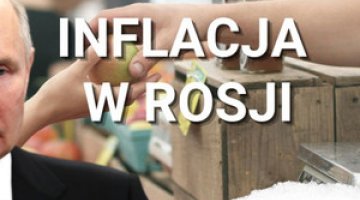Cracks in the marble. Russians’ trust in Putin on the decline
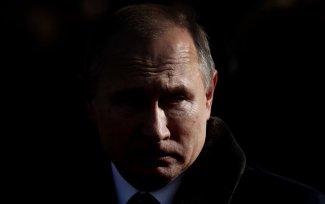
In 2018, a distinct downward trend began to emerge in public support for the Russian authorities – the president, government, and other political institutions. All opinion poll companies have recorded this decline, which applies not only to the authorities’ approval ratings, but also to their policies, including foreign policy, which has traditionally been an area in which the Kremlin has garnered popularity. The greatest losses have been seen in the ratings for Vladimir Putin, whose ratings have returned to the level recorded prior to the annexation of Crimea. For the first time since he has been in power, Putin has fallen behind the army, and in some cases the orthodox church as well, in the institutional opinion polls.
The falling support for the president and his policies is confirmation that “geopolitical successes” such as the annexation of Crimea are no longer a factor ensuring that the public stands behind the Kremlin. As the impression made by the geopolitical successes wears off, Russians are becoming more and more focused on domestic problems, above all the poverty resulting from a long-term decrease in real income. The event that triggered discontent and led to street protests was decisions made by the authorities that have been seen as unjust (such as raising the age of retirement).
Even though, seen objectively, the president’s ratings remain high, at approximately 60%, this downward trend, being a decrease of between ten and twenty percentage points, is a sign, under the Russian system, that the Kremlin’s legitimacy is fading. This system is largely based on a high level of support for Putin, while the other political institutions take a back seat. This change in the public mood is forcing the Kremlin to seek a new strategy, and at least partly concede to public demands. However, with little chance of the public’s expectations being met, it is unlikely that the decline in support for the authorities can be halted. Thus, the increasing deficiency in the Kremlin’s legitimacy means that the Kremlin is facing a difficult decision as to the policy to be followed from now on.
Losses for everyone, the greatest losses for the president
The fall in approval ratings for the government, led by the president, has been noted by all of the opinion poll companies – whether it is an independent Levada Centre, the governmental research centre WCIOM, or FOM, which is close to the authorities. Opinion polls in Russia are not always considered reliable, with many Russians treating pollsters as representatives of the state and giving pro-government responses due to fear of recriminations. This climate means at best that the true support for the authorities is even lower, while any difference is hard to estimate. Meanwhile, the consistency in the results obtained by various polling companies makes the observed downward trend more credible.
Over the last ten years, support for Vladimir Putin, defined in the polls as “performance approval”, has fluctuated quite significantly. It was on the decrease during the presidency of Dmitri Medvedev. The ratings for then Prime Minister Putin (who became president again and has ruled since 2012) gradually decreased from 86% in April 2008 to 61% in November 2013, the lowest level ever recorded by the Levada Centre. The turning point was the annexation of Crimea, which bumped up the president’s ratings by more than 25 percentage points to 86% in June 2014, and to a high of 89% in June 2015, Putin’s highest rating since taking up power.
Putin’s popularity returned to the preCrimea level in the summer of 2018, and in subsequent months decreased even further.
There has been a downward trend since that time, which sped up considerably in 2018 following an announcement and implementation of pension system reform, which is unpopular with the public. Putin’s popularity returned to the pre-Crimea level in the summer of 2018, and in subsequent months decreased even further. In January 2019 it was 64%[1].
Chart 1. Support for President Putin and Prime Minister Medvedev
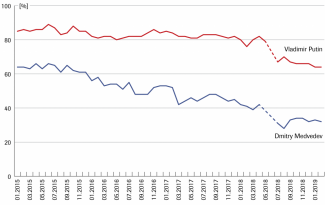
Source: https://www.levada.ru/indikatory/
The level of trust in government representatives is also falling. “Trust” is a separate category in opinion polls, an important one due to being distinct from “approval” (largely defined by the political limitations, and a feeling that there is no alternative). “Trust” illustrates more personal opinions of those in power, and is linked to the legitimacy of the regime. For this reason, the level of trust in those in power is considerably lower than that of approval. According to the Levada Centre, trust in Putin fell by as much as 20 percentage points in 2018, from 59% in November 2017 to 39% in September 2018[2]. WCIOM reports that trust in Putin in March 2019 had fallen to 32%, the lowest level since 2006[3]. Characteristically, Putin’s rating also fell in polls concerning institutions: the level of trust in the institution of president is at 58% (in 2017 – 75%) and has fallen for the first time to second place, behind the army (66%)[4]. In a WCIOM opinion poll of January 2019, the institution of president even fell to third place (62.1%), behind the army (84.7%) and the orthodox church (69.1%)[5]. There has also been a turnaround with respect to attribution of blame for the country’s problems. While in the past the government has mainly been blamed for the problems and increasing cost of living, most respondents currently blame the president. In the view of 55% of respondents, the president is principally to blame for problems (40% held this view in 2016), 37% say that the government is responsible (50% in 2016), and 21% – Prime Minister Medvedev (32% in 2016). Paradoxically, in the same poll, Putin was named as having made the greatest contribution to Russia’s economic successes and the improved standard of living (55%; the government – 13%; the prime minister – 4%)[6].
Chart 2. Trust in President Putin
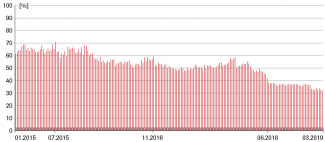
Source: https://wciom.ru/news/ratings/doverie_politikam/
Chart 3. Support for institutions – the president, the army, and the Orthodox Church
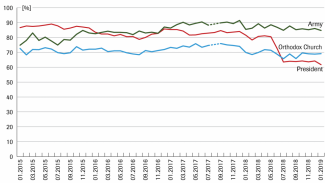
Source: https://wciom.ru/news/ratings/odobrenie_deyatelnosti_gosudarstvennyx_institutov/ and https://wciom.ru/news/ratings/odobrenie_deyatelnosti_obshhestvennyx_institutov/
Data concerning the President of the Russian Federation was averaged, basing on data from surveys carried out in individual months.
Despite the fact that all of these institutions have recorded a drop in support in recent years, the president has incurred the greatest losses. The Levada Centre reports that the fall in support for the president (approval rating) was almost 14 percentage points (from 76% in February 2018 to 62% in January 2019), and the decrease in the level of trust – 20 percentage points (from 59% in November 2017 to 39% in September 2018). For the sake of comparison, support for other institutions has fallen over the last year by 10 percentage points for Prime Minister Dmitri Medvedev, 5 percentage points for the government, 3 percentage points for regional authorities, and 8 percentage points for the Duma[7].
There is a downward trend in ratings not only of domestic policy, but also foreign policy, which for many years boosted the president’s ratings.
An institution that has emerged unscathed from the deepening crisis in trust on the part of the public is the army. According to WCIOM surveys, the army has significantly improved its rating over the last six years, from 52% in 2012 to 65% in 2014, and 87% in 2018[8]. According to a Levada Centre survey, the level of trust in the army rose from 39% in 2012 to 66% in 2018[9]. As mentioned, the army currently leads in surveys on public trust carried out by various polling companies, which is a novelty over the course of Putin’s rule[10].
The fall in the ratings of the President and other institutions is accompanied by a negative trend in opinions held about the authorities’ broader policies – domestic policy, but also foreign policy, which for many years met with approval, and boosted the president’s ratings. Ratings for the Russian authorities’ domestic policy decreased more than twofold in relation to the peak in the first quarter of 2015. At that time, 56% of respondents approved of domestic policy while the figure today is 23% (a fall of 6 percentage points since June 2018, when the pension system reform was announced)[11]. There is also a decline in public optimism regarding the state of the country. Over the last year, this has decreased by 9 percentage points (from 54 to 45%)[12]. There is also less support for foreign policy – an increasing number of Russians take the view that the authorities focus too much on foreign policy (up from 17% in 2015 to 32% in 2019), while a decreasing number say that they strike the appropriate balance in terms of attention to foreign policy (down from 55 to 38%)[13]. There is also a growing belief that Russia has had more failures than successes in foreign policy (from 15% in 2017 to 25% in 2019), and less Russians say that it is largely successful (from 64 to 45%). The fact that “providing aid for Syria” is heralded as the greatest foreign policy success in recent years (15%) is further proof that annexation of Crimea has exhausted its potential as a mobilising factor (6% of respondents consider this a success). At the same time, respondents are unhappy at the amount of funds designated to provide support for other countries (in the form of supply of cheap raw materials, humanitarian aid, and writing off of debt) and designated to military operations instead of social welfare issues at home.
Return to the domestic agenda
The rapidly changing public mood illustrates that the “Crimea factor” has run its course as a tool for mobilising the public behind the Kremlin and raising the president’s ratings. The effect of this factor, which outweighed the need for a sensible economic approach, could be seen in the mood in the first year following annexation. Even though Russians suffered due to a drop in the Ruble and sanctions (sanctions imposed by the West and Russia’s countersanctions, depriving Russians of cheaper and good quality food imports), the opinion regarding the government’s economic policy improved at that time by 10 percentage points, from 26% in the first quarter of 2014 to 37% in the second quarter of 2015)[14].
In Russia, real incomes have fallen for the fifth year in a row; since 2014 they have fallen by approximately 12%.
However, as the euphoria felt due to Russia’s geopolitical successes faded, domestic issues once again became the most important, above all the increasing poverty. In Russia, real incomes have fallen for the fifth year in a row; between December 2014 and December 2018, accounting for inflation, incomes have fallen by approximately 12%, while the main factor causing inflation is the raising by the state of communal and transportation charges[15]. This decrease in incomes is not countered by the official salary increases, especially as just under half of people’s income is taxed (approximately 45%) and the rest is unofficial income. There is almost no rise in pensions (apart from a one-off payment made in 2018 to pensioners who are not in work), and income from business activity and lease of property is falling[16].
The increasing poverty among Russians is confirmed by official Rosstat data: towards the end of 2017 (the latest data available) 13.2% of the population (19.3 m people) were living below the poverty line, which is an increase of 3.2 m since 2014[17]. Moreover, many experts consider Rosstat’s calculations to be understated[18]. According to a report produced by the Russian Presidential Academy of National Economy and Public Administration, 22% of the population are believed to be living below the poverty line[19]. Polls also reveal a more serious picture of the standard of living – according to a Levada Centre survey, the percentage of the public whose funds only cover the cost of food, or do not even cover the cost of food, has increased over the last four years from 16 to 24%[20]. The amount of consumer credit among the population is rising – in 2018 this increased by 12%. The number of people who have high levels of credit is estimated to be 27%; the number of people who had three credit arrangements increased in 2018 by 12%, and of those with four credit arrangements – by 14%, and five – by 19%; debts are also on the increase[21].
Outraged by injustice
For many years, social and economic problems alone were not sufficient reason for Russians to actively express their discontent. Even during the period in which the standard of living was falling in 2016–2017, the mood among Russians was quite optimistic, due to adaptation to the difficult economic situation and hope that it would improve[22]. The level of discontent grew only when the fall in the standard of living was compounded with other factors – geopolitical campaigns no longer having any propaganda value, and government decisions that were seen as unjust. The optimism among the people was shaken by pension reform pushed through by the government and president in 2018 despite stiff opposition on the part of the public (more than 90% of Russians were against the reform). This reform meant that the time spent in work was extended by five years, postponing the prospect of retirement for some, and depriving others of the possibility of combining their pension with additional earnings. Russians perceived the reform not only as depriving them of a portion of their income (or much-desired rest) but also as a manifestation of social injustice, and a solution employed by the government to the country’s economic problems solely at the public’s expense.
Pushing through the pension reform caused the president’s ratings to fall more quickly and led to increased accusations that he has “forgotten about the common people”.
The reform triggered public anger and led to protests, and also exacerbated sensitivity to other symptoms of injustice, to the unequal spread of wealth, and to the privileged position and arrogance of the elite. The president, who assumed responsibility for the pension reform, suffered significant falls in his ratings, and has been increasingly accused of “forgetting about the common people”, and “not knowing how common people live”[23]. Cases of arrogant conduct on the part of government officials began to evoke significant reactions. Polls reveal a growing lack of trust on the part of Russians in the state and government officials, which is twice as high as towards fellow citizens, the immediate community, and family. More than half of respondents in Levada Centre polls (52%) say that the Russian authorities lie about the state of the country (up from 37% in 2017), while 12% say that they tell the truth (down from 20%) – 25% believe that they are lied to by their fellow citizens[24].
Opinion polls and research show that Russians are developing a greater need for justice, not only with regard to social welfare issues, but also with regard to equality of all citizens before the law. There is increasing demand for respect for the public and for standards of integrity in domestic politics. There is increasing disillusionment with the idea of a strong leader capable of solving any problem[25]. There is also a slowly increasing sense among Russians that they can act for themselves and have an influence over not only their own situation, but also the state of the country. 18% of respondents feel responsible for what happens in their country (compared to 9% in 2017), and 10% say that they have an influence over that situation (compared to 5% in 2017)[26]. At the same time, Russians are becoming more willing to play an active role in politics – currently, 25% of respondents are willing to do this (16% in 2017), which is a record level for the last 12 years[27].
Yellow card for the Kremlin?
In addition to the falling ratings of the government, public discontent has also been seen over the last year in the form of an increasing number of street protests, mainly concerning social welfare and economic issues. In 2018, there were protests against the pension system reform in most regions of Russia, and in many regions protests regarding the environmental problems caused by landfills. Increases in fuel prices, increasing communal charges, and a high “environment” fee introduced in January 2019 for waste segregation and treatment, are causing discontent. The percentage of Russians willing to take part in protests has grown – from 19% in 2017 to 37% in 2018[28]. Following a period of social calm following the annexation of Crimea, protests have again, since 2017, become a permanent feature of the situation in Russia. Protests are regularly held in many regions of Russia, including in medium-sized and small towns. They are limited in number, however: the largest numbers of participants in protests against the pension system reform were seen in Moscow, of approximately 10,000. Individual actions attracted a large percentage of town residents, for example in the case of protests against landfills that have a toxic effect on small towns around Moscow – as many as one third of the total number of residents[29].
President Putin’s annual address, filled with social welfare commitments, demonstrated concern on the part of the authorities.
Public discontent can also be seen in the results of local elections in September 2018 (shortly after the pension system reform was announced): in some regions, the Kremlin’s candidates lost to random rivals[30].
The authorities have not left these negative social trends unanswered. The first major sign of concern was President Putin’s annual address on 20 February 2019, mainly focusing on social welfare issues and promises that people’s lives would improve. This contrasts with speeches made in recent years, with a mainly anti-West, superpower, and military tone. This year’s address contained extensive promises concerning social welfare questions, intended for families and people with the lowest incomes, proposals to improve the condition of the health service, education, and the environment, and the possibility of deferment of repayment of consumer credit. At the same time, Putin warned government officials at various levels, as he has done repeatedly, making them responsible for implementing those commitments[31]. Another social “gesture” towards the public are ‘national projects’, in areas such as demographics, the health service, education, housing, the environment, etc. These were announced by Vladimir Putin in May 2018 following his election as president, and the government is now determining how these projects will be financed in the budget.
The public is sceptical about the president’s promises. It supports them but is not convinced that they will be enacted. This is a result of distrust towards the state that has accumulated over many years[32]. Polls conducted following the speech did not show a major improvement in the president’s ratings. According to the FOM they remained unchanged, moreover, 38% started to trust the president less over the period of the last month, and only 15% more[33]. In WCIOM polls, meanwhile, a slight increase in the president’s approval ratings in the last week (from 62.6 to 64.8%) was accompanied by an equally small decrease in trust (from 33.5 to 32.8%[34]).
The drop in support and increasing number of protests presents a major challenge for the authorities. Even though the regime in Russia is authoritarian and employs repressive measures towards the people, to date the repression has been selective and limited. For many years, the authorities focused more on recognising and steering the public mood, and the economic boom (apart from the economic crisis in 2008–2009) enabled the standard of living to improve. This translated into a high level of support for the government, which was the basis of the Kremlin’s legitimacy, in turn allowing the state to be governed arbitrarily and enabling benefits to be reaped, abuses to be committed, and civil rights restricted. Under this system of government, a larger drop in the president’s ratings (even though they remain objectively high) is a warning and an indication of fading legitimacy. The previous fall, in 2010–2013, was accompanied by disquiet among the business and intellectual elite and socially active groups,
The post-Crimea period of consolidation is now coming to an end, which means that those in power face difficult decisions regarding further social strategy.
a demonstration of weariness with Putin’s rule, and a wish to modernise the country. The Kremlin found a solution in the annexation of Crimea. This not only raised the president’s ratings; it also brought the debate on the need for systemic changes to a complete close for a number of years. The Crimean “all or nothing” gamble produced a series of gains for the Kremlin. At the same time, it might have made the president ‘dizzy with success’, and his political empathy and ability to detect social tendencies - numbed. The president seems to be convinced that the annexation gave him carte blanche for activities at home[35], including those as unpopular as reducing social benefits. Accordingly, the Russian budget for the period up until 2020 provided for reduction in social spending from 5.5% of GDP (2017) to approximately 4.4%, cuts in the number of health service facilities, and abolition of relief and subsidies, for example for medicine[36].
The post-Crimea period of consolidation is now coming to an end, which means that those in power are faced with the problem of further social strategy. The Kremlin will probably take measures to implement at least to some extent Putin’s social welfare commitments. This is possible due to the reserves accumulated as a result of the increase in the price of oil. Fully meeting the public’s demands, on the other hand, does not appear to be very realistic. This is due both to the ineffective state model and extensive bureaucracy, which is incapable of implementing change effectively, and to the broad, systemic nature of the public’s social demands – for improvements with regard to operation of the health service, the state of the environment, and finally the government’s overall attitude towards the people. It also does not seem very likely that any geopolitical campaigns (such as further integration with Belarus) would produce the desired effects with respect to propaganda and compensate for the domestic problems, although the government can play on the sense of a threat from the West and enflame fears of another global conflict[37]. The consequences of escalation of repression might also be in doubt. For many years, the authorities have employed acts of repression selectively towards active opponents and have been developing legal instruments to continue to persecute them. However, escalation of acts of repression and employing them on a large scale could harm the Kremlin’s image and cause further loss of support.
On the other hand, lengthy, large-scale protests and the creation of civil structures that would lead to a permanent change in the relationship between the authorities and the society are equally unlikely. The likelihood that this would happen is reduced by the continued passivity and fragmentation among the public, which is a legacy of the USSR. Even though the protests are quite numerous and are attended in large numbers, they are brief and die out quickly, usually without the intended result being achieved. The broad downward trend with respect to support for the government, combined with the growing sense among the public of control over their own lives and of a need for change, could however present the Kremlin with a serious challenge. They are forcing the government to redefine its tactics in light of changing social attitudes and a developing crisis of legitimacy. The authorities will probably attempt to meet social welfare demands at least to some extent, while due to a number of factors (the scale of the needs, efficiency of public authorities, the cuts in social welfare made in the past) this could have limited effect. Other scenarios that in the past enabled the Kremlin to strengthen its position (geopolitical campaigns, domestic repression) could also have only a temporary effect. The president’s speeches and discussions among state experts show in turn that the ruling camp does not have a new, comprehensive vision for development of Russia, and also often does not have the political will to agree to the demands and “dignity” aspirations of a significant portion of Russian society.
[2] Most recent Levada survey on trust in leading politicians of October 2018, https://www.levada.ru/2018/10/08/doverie-politikam-2/
[3] In the past the lowest level of trust in Putin (37.4%) was recorded in December 2011during mass protests, https://wciom.ru/index.php?id=236&uid=9518
[4] 'Доверие пятой части россиян потерял Владимир Путин за прошедший год’, https://www.levada.ru/2018/10/08/doverie-pyatoj-chasti-rossiyan-poteryal-vladimir-putin-za-proshedshij-god/.
[5] See WCIOM survey https://wciom.ru/news/ratings/odobrenie_deyatelnosti_gosudarstvennyx_institutov/ i https://wciom.ru/news/ratings/odobrenie_deyatelnosti_obshhestvennyx_institutov/ (Excel tables can be downloaded showing changes in mood since 2006).
[7] https://www.levada.ru/indikatory/; https://www.levada.ru/2018/10/04/institutsionalnoe-doverie-4/
[10] ‘Когда армия выше президента’, https://www.levada.ru/2018/10/17/kogda-armiya-vyshe-prezidenta/
[15] А. Трушин, К. Журенков, ‘Ловушка бедности’, «Огонек», 25.02.2019, https://www.kommersant.ru/doc/3874090
[16] Ibidem.
[18] Р. Фаляхов, ‘Бедность в России: десятки миллионов за чертой’, Газета.ru, 9.05.2018, https://www.gazeta.ru/business/2018/05/09/11745109.shtml
[19] ‘РАНХиГС: Почти все россияне вынуждены экономить’, а 22% живут в бедности, «Бизнес Online», 21.11.2018, https://www.business-gazeta.ru/news/403263
[21] С. Самусева, К. Дементьева, ‘Число закредитованных граждан растет’, «Коммерсант», 20.02.2019, www.kommersant.ru/doc/3889528
[22] Ibidem.
[23] Ibidem.
[27] https://www.levada.ru/2019/01/24/dolya-zhelayushhih-uchastvovat-v-politike-rossiyan-dostigla-maksimuma-za-12-let/
[29] For more information see J. Rogoża, ‘A stinking business. Environmental issues, protests and big money in the waste business in Russia’, OSW Commentary, 28.08.2018, https://www.osw.waw.pl/en/publikacje/ osw-commentary/2018-08-27/a-stinking-business-environmental-issues-protests-and-big
[30] See M. Domańska, ‘Defeat for the Kremlin in regional elections’, OSW Analyses, 26.09.2018, https://www. osw.waw.pl/en/publikacje/analyses/2018-09-26/defeat-kremlin-regional-elections
[31] For more information see I. Wiśniewska, J. Rogoża, W. Rodkiewicz, M. Domańska, ‘Putin’s welfare address’, OSW Analyses, 20.02.2019, https://www.osw.waw.pl/en/ publikacje/analyses/2019-02-20/putins-welfare-address
[32] Е. Мухаметшина, ‘Послание президента не помогло поднять рейтинги власти’, «Ведомости», 3.03.2019, https://www.vedomosti.ru/politics/articles/2019/03/03/795536-ne
[33] https://fom.ru/Politika/10946
[34] https://wciom.ru/index.php?id=236&uid=9582
[35] See also Т. Становая, ‘Что-то не так с президентом. Как Россия проглотила Крым, а Крым – Владимира Путина’, Republic, 4.03.2019, https://republic.ru/posts/93197
[36] ‘Putin po raz czwarty’, „Raport OSW”, 18.03.2018, p. 32, https://www.osw.waw.pl/sites/default/files/raport_pl_putin_net.pdf
[37] Public more concerned about agression from other countries: https://www.levada.ru/2019/01/30/bolee-poloviny-rossiyan-sochli-realnoj-ugrozu-vojny-s-drugimi-stranami/




